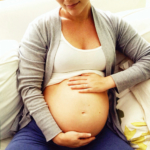Brain-derived neurotrophic factor (BDNF) is a growth factor which acts on neurons in both the central and peripheral nervous systems, promoting the survival of neurons and promoting the growth and differentiation of new neurons and synapses. In the brain, it is most active in the hippocampus, cortex, and basal forebrain—areas important to learning, memory, and higher executive functioning.
In animal models it has been shown that exposure to stress, and specifically the stress hormone cortisol, decreases the expression of BDNF. In humans evidence suggests that BDNF may be involved in the pathogenesis of major depression, such that the levels of BDNF are decreased in depressed patients. Further support for this hypothesis is the finding that conventional antidepressants reverse this effect and restore normal BDNF levels.
A recent study examines BDNF levels across pregnancy and the link between BDNF levels and maternal depression. Serum BDNF and cortisol levels and depressive symptoms (using the CES-D) were assessed during each trimester and again at 4–11 weeks postpartum among in a group of 139 women (77 Black, 62 Caucasian).
The researchers observed that serum BDNF declined considerably in both Black and Caucasian women from the 1st through 3rd trimesters and subsequently increased during the postpartum period, with overall higher BDNF and lower cortisol levels in Black participants. Controlling for race, women with lower serum BDNF at both the 2nd and 3rd trimesters were more likely to report depressive symptoms during the 3rd trimester. In addition, lower BDNF levels (but not depressive symptoms) in the 3rd trimester were associated with lower birth weight.
Another study assessed BDNF levels in 340 Chinese women at the time of delivery. In this group, 37 women (10.9%) met criteria for postpartum depression (PPD). Serum BDNF levels in women with PPD were significantly lower than BDNF levels in women without PPD. The optimal cutoff value for serum BDNF levels as an indicator of PPD was estimated to be 12.0 ng/ml, which yielded a sensitivity of 82.8% and a specificity of 72.6%. When they used this cutoff value, they observed that women with a BDNF level of ?12.0 ng/ml were about seven times as likely to have PPD than women with higher BDNF levels (OR 7.243, 95% CI: 3.883-12.746; P<0.0001) after adjusting for possible confounders.
Is BDNF a Biomarker for Perinatal Depression?
Biomarkers (or biological markers) can be a powerful clinical tool and are used in many fields of medicine to provide objective information on normal or pathological biological processes and to predict response to therapeutic interventions. Researchers have long searched for biomarkers which could be used to identify women with perinatal depression or, even better, to predict which women are at highest risk for depressive illness during pregnancy and the postpartum period.
Larger studies will be needed to better evaluate the usefulness of BDNF levels to predict depressive illness in pregnancy and postpartum women. Given that BDNF levels may differ in women depending on race and ethnicity, it will be important to study BDNF levels in more diverse populations.
Looking beyond the question of BDNF as a potential biomarker, one must also consider the diverse activities of this growth hormone: BDNF is necessary for placental development, fetal growth, glucose metabolism, and energy homeostasis. Thus, decreased BDNF levels in the mother may be associated with other adverse outcomes, including miscarriage, placental insufficiency, and preterm birth.
Ruta Nonacs, MD PhD
Christian LM, Mitchell AM, Gillespie SL, Palettas M. Serum brain-derived neurotrophic factor (BDNF) across pregnancy and postpartum: Associations with race, depressive symptoms, and low birth weight. Psychoneuroendocrinology. 2016 Dec;74:69-76.
Gao X, Wang J, Yao H, Cai Y, Cheng R. Serum BDNF concentration after delivery is associated with development of postpartum depression: A 3-month follow up study. J Affect Disord. 2016 Aug;200: 25-30.








Leave A Comment